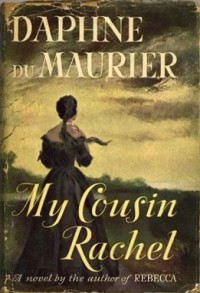She would fling these pin-pricks in the air
 My Cousin Rachel
My Cousin Rachel
by Daphne du Maurier
I really truly thought I had read this before and that picking it up on holiday would be a re-read, but it became increasingly clear that this was entirely new to me. It’s nice when you find a new-to-you book by a favourite author, right? This was Daphne du Maurier’s last real big success, though she wrote several more books after it, and is often held up as her greatest work (yes – even greater than Rebecca, some say).
Philip has been raised by his cousin Ambrose since he was orphaned young and together they run an estate in Cornwall. Philip is a young man, while middle-aged Ambrose has never married. Until, that is, he travels to Italy for his health and meets his distant cousin Rachel. She’s a half-Italian widow in her 30s who shares Ambrose’s love for gardens and he is soon besotted. But can she be trusted? And is naïve Philip going to be forever spoiled by knowing her?
“Something was happening to the eyes that looked at me. The face was very white and still; that did not change. Had I ground the face to powder with my heel, the eyes would have remained, with the tears that never ran down upon the cheeks, and never fell.”
As the story is narrated by Philip, his complete lack of experience of women, verging on misogyny, colours everything. He so admires his cousin Ambrose, who has done perfectly well without women for most of his life, that he is convinced that he too does not need them. But of course Rachel changes everything.
“That was the infuriating thing about a woman. Always the last word. Leaving one to grapple with ill-temper, and she herself serene. A woman, it seemed, was never in the wrong. Or if she was, she twisted the fault to her advantage, making it seem otherwise. She would fling these pin-pricks in the air, these hints of moonlight strolls with my godfather, or some other expedition.”
Like Rebecca this is a psychological thriller disguised as a romantic drama. The novel’s opening makes clear something dark and terrible has happened, but some parts of the story remain a mystery, though strong hints are dropped as to what might have happened. Like Rebecca‘s narrator, Philip isn’t entirely likeable and he is equally frustrating. And Rachel is if anything a more interesting villain than Mrs Danvers, because it’s never clear if she intends well and is a victim of circumstance, or if she’s plotting evil the whole time.
As always, Du Maurier is strong on setting, particularly Cornwall, and as I was in Cornwall reading it, I couldn’t have felt more immersed. The scenes in Italy are a little less alive, but they are suffused with a certain unreality as Philip hates being away from home and is emotionally in a bad place.
“The shocks of corn were golden in the last rays of the sun. The sea was very blue, almost purple where it covered the rocks, and had that deep full look about it that always comes with the flood tide. The fishing fleet had put out, and were standing eastward to catch the shore breeze.”
I’m not sure I’d go so far as to say this is better than Rebecca, but it’s certainly the first Du Maurier I’ve read that comes close. Part of my fondness for Rebecca comes from familiarity, having re-read it a few times, and I can certainly see myself coming back to this again, so who knows in time which one I’ll rate most highly!
Published 1951 by Victor Gollancz.
Source: Borrowed from holiday home.
Challenges: This counts towards the Classics Club.